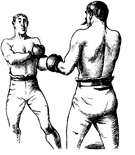
The Rough Edges of Socialism
CHRIST & NEIGHBOR
I have just returned from completing six days of eye strain in the New York Public Library, poring over microfilm copies of The Christian Socialist, a newspaper published in the Midwest, mostly Chicago, between 1903 and 1922. As socialist periodicals go, that is a long time. At the time of its demise it was the second oldest English-language publication in the country that expressed a socialist bias. As Christian socialist publications go, it holds the U.S. record. The world record is held by Tijd & Taak (Time & Task), which has been published in the Netherlands since 1902 and is still going strong. Reading Thomas Molnar’s splendid article “The Vatican Looks at Non-Marxist Socialism” in the July-August issue of the NOR, I was reminded of the trials and tribulations, and fatal errors, of the Rev. Edward Ellis Carr, who edited The Christian Socialist for 17 of its 19 years and exercised influence on a sizeable part of the Protestant community, including at one point 20,000 subscribers (and 1,600 clergymen).
Carr was a large, handsome man whose early pictures, frequently displayed in his paper, resemble one of the more intelligent members of almost any college football team. He had a florid, sentimental writing and speaking style, somewhat like his idol Eugene V. Debs, but without the air of gaunt passion and suffering, and occasional flash of genius, that made Debs a truly memorable figure.
Carr was shocked by evidence — highly circumstantial, as it turned out — of sexual hanky-panky in the national office of the Socialist Party (SP), also in Chicago. Simultaneous charges had been brought against J. Mahlon Barnes, National Secretary of the Party, by Mother Jones, the miners’ beloved champion, also by another Socialist of prominence, James Brower, and by a former SP office secretary, Marguerite Flaherty. They involved financial irregularity, incompetence, drunkenness, and immorality, the latter depending mainly on the guesswork — probably accurate, as it turned out — of Flaherty.
The National Executive Committee (NEC), a seven-member body that did not include Debs, dismissed the charges without trial and with little more than a cursory investigation. Carr filled pages of The Christian Socialist with lurid detail and commentary that included assumptions of guilt, threats and boasts of what The Christian Socialist and its attendant organization, The Christian Socialist Fellowship, could and would do if Barnes and the women involved, one of whom sat on the NEC, were not brought to justice.
You May Also Enjoy
Those who have studied conventional economics will find in Heinrich Pesch a starting point that is faithful both to economic facts and to the Church's teaching.
We cannot leave politics and economics, or war and peace, to the devil on the plea that it is too complex or too difficult to implement real reform.
Jesus promises that if we are anxious about others first, then we need not be anxious about ourselves, for all these things will be added unto us.

